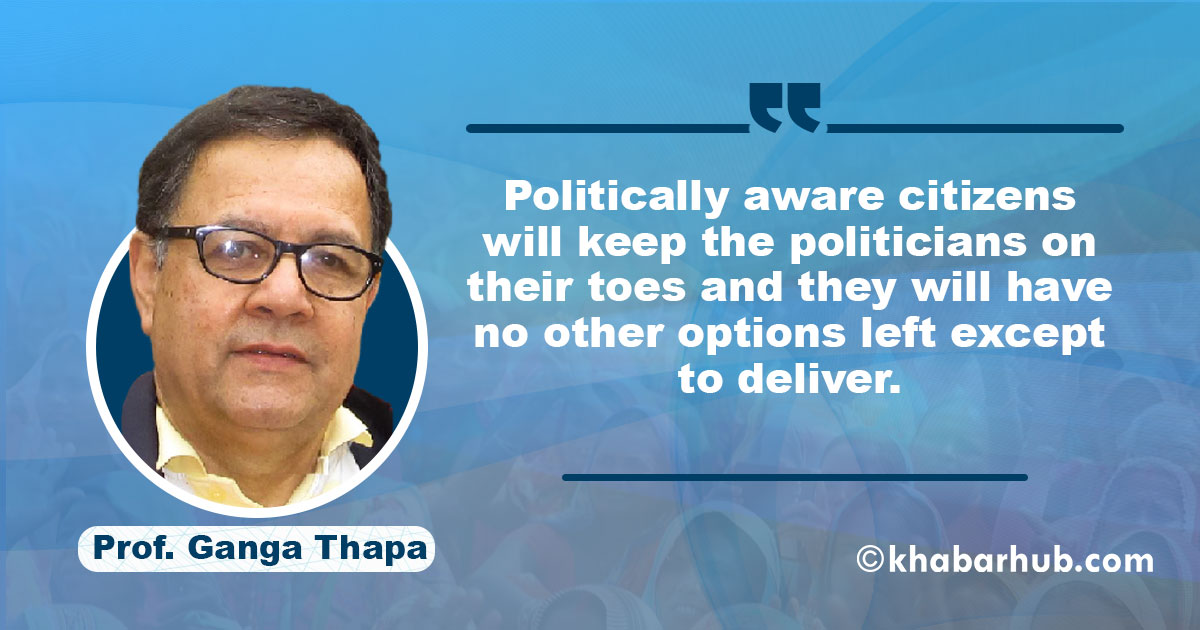Since 1990 Nepal has achieved a number of major political accomplishments and has met the popular demands of people which were formally institutionalized through the subsequent political settlement in 2006 — the year Maoists were formally incorporated into the parliamentary democracy system.
But, politicians have become myopic. They have neglected citizens’ demands and priorities set for the overall development of the country. Peripheral concerns of personal aggrandizement, red tapes in bureaucracy, corruption in the system, promotion of nepotism and kinship both within the government and the party are taking center stage in Nepali politics. Considering people as clients of the state instead of major stakeholders is the new trend amongst the politicians while assessing the political outcomes of their decisions. Nepal being an emerging democracy with an enormous socio-economic inequality requires a responsive democracy where political party constantly reviews its structure and policy to serve the people so that favoritism to a select few ends without any further delay. Nepal’s representative democracy must keep people in the center. Political parties exist to represent the people.
Citizens themselves play a crucial role in shaping the political beliefs and actions of political leaders. Politically aware citizens will keep the politicians on their toes and they will have no other options left except to deliver.
Nepalese people will not favor any other governing model except democracy. Elections help them choose their representatives periodically based on their work performance. Periodic elections in this manner reinforce democracy and help people’s aspirations be fulfilled by bringing in development in their constituency. Institutional reforms at all level in line with democratic spirit will allow people’s participation and will further help inequitable distribution of resources. It is essential for ensuring the rule of law and good governance thereby laying the foundation of democracy from top to bottom. Coteries and cronyism in political corridors will no more influence the political decisions as transparency in political governance. This will help clean the political system. The disrepute of Nepali politicians will keep them away from misleading the people who will now be armed with political awareness.
Effective plans and programs must reflect the aspirations of millions of Nepalese people. The state power obtained through elections in which commoners participate will definitely work towards ending poverty, discrimination, and political violence. Political governance at three levels in federalism go down to the people in order to serve them. Divisions of power all across among legislature, executive and judiciary make democracy effective and enduring. Monarchy has no such system of governance and hence it has been thrown out in Nepal to replace it by democracy.
The available research literature on Nepal’s democracy often portrays that the lack of opportunity to the citizens to articulate their wide range of interests in public decision-making by creating transparent rules for its functioning is eroding their confidence in representative institutions.
Citizens themselves play a crucial role in shaping the political beliefs and actions of political leaders. Politically aware citizens will keep the politicians on their toes and they will have no other options left except to deliver.
It is reasonable to think that Nepal is still an unconsolidated democracy. We apprehend destabilizing forces taking over us. The rise of a potential demagogue and the neo-populist political figure will subvert newly established democracy in Nepal.
Therefore, the widespread participation of all sections of the society in elections and policymaking will keep potential saboteurs in check and it will be instrumental in setting up deliberative democracy on Nepalese soil. A democratic regime so consolidated with power to deliver better economic and societal outcomes will continue to guide the society in the long-run.
While democracy may be a contested political concept, Nepal’s key problem is akin to what Mainwaring has pointed as poor state performance to provide stable governance and pertinent services on the principle of thoroughly open participation and transparent disclosure. (Mainwaring 1995). The available research literature on Nepal’s democracy often portrays that the lack of opportunity to the citizens to articulate their wide range of interests in public decision-making by creating transparent rules for its functioning is eroding their confidence in representative institutions.
(To be continued…)
Views expressed in this article are the author’s own and do not necessarily reflect the stance of Khabarhub.









Comment